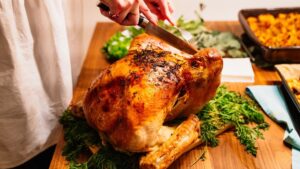Should You Wash the Turkey?
go.ncsu.edu/readext?754131
en Español / em Português
El inglés es el idioma de control de esta página. En la medida en que haya algún conflicto entre la traducción al inglés y la traducción, el inglés prevalece.
Al hacer clic en el enlace de traducción se activa un servicio de traducción gratuito para convertir la página al español. Al igual que con cualquier traducción por Internet, la conversión no es sensible al contexto y puede que no traduzca el texto en su significado original. NC State Extension no garantiza la exactitud del texto traducido. Por favor, tenga en cuenta que algunas aplicaciones y/o servicios pueden no funcionar como se espera cuando se traducen.
Português
Inglês é o idioma de controle desta página. Na medida que haja algum conflito entre o texto original em Inglês e a tradução, o Inglês prevalece.
Ao clicar no link de tradução, um serviço gratuito de tradução será ativado para converter a página para o Português. Como em qualquer tradução pela internet, a conversão não é sensivel ao contexto e pode não ocorrer a tradução para o significado orginal. O serviço de Extensão da Carolina do Norte (NC State Extension) não garante a exatidão do texto traduzido. Por favor, observe que algumas funções ou serviços podem não funcionar como esperado após a tradução.
English
English is the controlling language of this page. To the extent there is any conflict between the English text and the translation, English controls.
Clicking on the translation link activates a free translation service to convert the page to Spanish. As with any Internet translation, the conversion is not context-sensitive and may not translate the text to its original meaning. NC State Extension does not guarantee the accuracy of the translated text. Please note that some applications and/or services may not function as expected when translated.
Collapse ▲To wash or not to wash the turkey – that is the question.
Listen to Professor Ben Chapman from NC State University explain why you should not wash your turkey.
Should you have any food preparation, cooking or storing questions – please reach out to our Food Consumer Science Agent, Abigail Pierce at Abigail_Pierce@ncsu.edu
Don’t Want Food Borne Illness? Don’t Wash That Poultry
Editor’s Note: This is a guest post from Lisa Shelley, a food safety researcher in NC State’s Department of Agricultural and Human Sciences. You may also be interested in a series of videos from NC State on how to avoid foodborne illness over the holidays.
The holidays are just around the corner and this year might feel at least a little more normal than our first pandemic holiday season. People are more likely to gather with friends and family, and to celebrate with a roasted turkey, chicken or goose. But some kitchen traditions are best avoided if we want to avoid foodborne illness. One of those is the idea that you need to wash or rinse your poultry before cooking it.
The Centers for Disease Control and Prevention (CDC) estimates that one million people in the U.S. each year get sick from raw or undercooked poultry. Eating undercooked poultry – or eating other foods that have been contaminated by raw poultry and its juices – can cause foodborne illness. And with an estimated 45 million turkeys being prepped, cooked and served for Thanksgiving alone, it is important to keep in mind best poultry preparation practices to keep everyone at the table happy and healthy.
To start, do not wash the turkey. Washing can splash potentially contaminated droplets and juices onto the countertop and nearby utensils and ready-to-eat foods. An even greater concern is that washing the bird will contaminate the sink and, if not cleaned and sanitized properly, pose a significant cross-contamination risk.
That’s because other food preparation, such as vegetable scrubbing or rinsing lettuce, happens in the sink – and contaminated drops in the sink can splash or bounce onto other foods or utensils in the sink basin.
Recent research shows that people do not properly clean and sanitize the sink after washing poultry. Most people just rinse the sink with water, making the sink a source of cross-contamination of food and other items.
In fact, the sink is a potential source of contamination even without any turkey washing. That means it is important to clean and sanitize even if you don’t wash your bird – but especially so if there is a chance that raw turkey parts or juices might have touched the sink. Sinks should be cleaned with soapy water and then a sanitizer, such as a commercial all-purpose or multi-purpose cleaner with bleach.
Hands, another potential source of cross-contamination, should be washed right after handling the raw turkey or contact with its juices. Proper handwashing (wetting hands, using soap, and scrubbing for 20 seconds) plays a key role in reducing the spread of disease-causing germs from COVID-19, influenza, or foodborne pathogens such as Salmonella, which can be found in turkey.
Finally, once that turkey is in the oven, use a food thermometer to check that it is cooked to 165 degrees F to kill any disease-causing bacteria that might be in the turkey. Cooking to a safe internal temperature is the best (and only) way to kill bacteria that could cause disease – washing or brining the turkey will not destroy bacteria.
Keeping these best practices in mind will help ensure that everyone enjoys a safe holiday meal with family and friends this year and for more normal years to come.
This post was originally published in NC State News.




